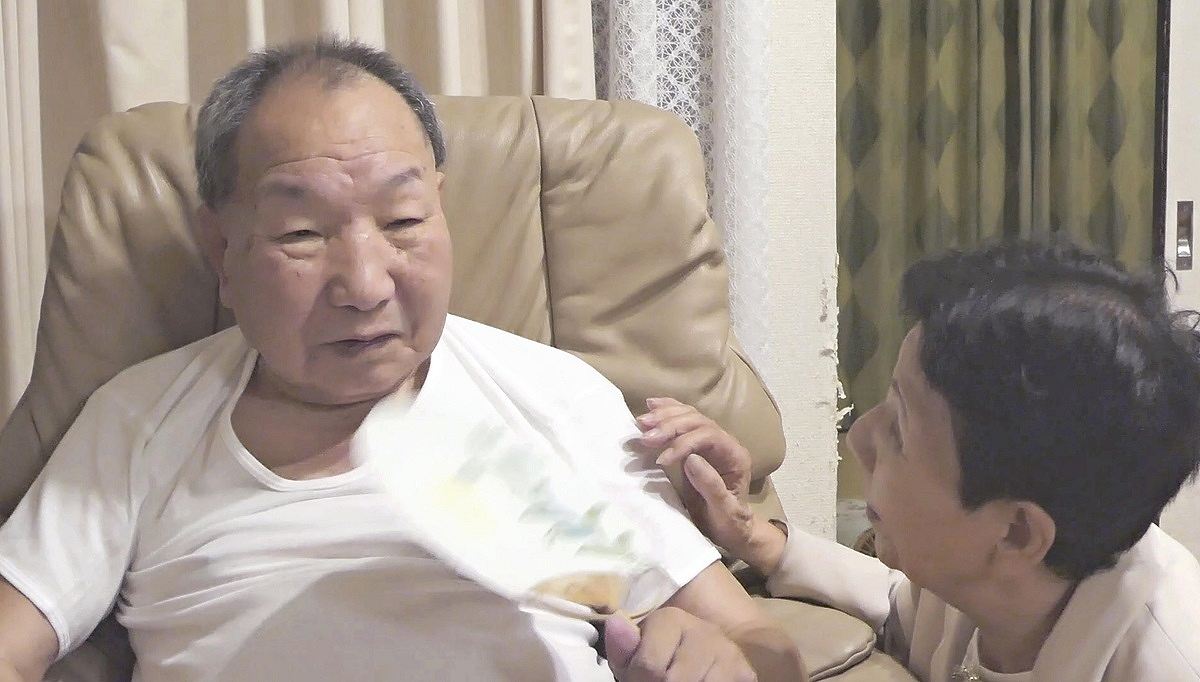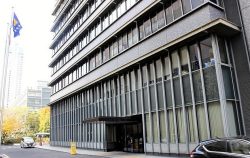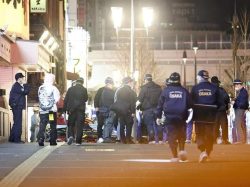Hakamata, Suffering from Communication Problems Since Prison, Offers No Reply When Told of His Acquittal

Hideko Hakamata, right, tells her brother Iwao he was acquitted, in Hamamatsu around 10 p.m. on Thursday. This image was taken from video.
14:38 JST, September 27, 2024
Having spent most of his life as a prisoner on death row, Iwao Hakamata, now 88, has been found not guilty in a retrial, 58 years after he was arrested.
In Thursday’s ruling by the Shizuoka District Court, the presiding judge not only went so far as to assert investigators fabricated evidence but also made an unprecedented apology. Hakamata’s family and supporters met the long-awaited ruling with a mixture of joy and surprise.
“The defendant is not guilty,” said presiding Judge Koshi Kunii, speaking clearly and looking straight at Hakamata’s sister Hideko, 91, who was sitting in a chair at the witness stand.
Hakamata — whose life has been troubled since he was accused of robbing and murdering four people in Shizuoka Prefecture in 1966 — was absent from the courtroom. He suffers from mental illness and developed “detainment syndrome” due to his 48 years in detention.
Hideko has devoted her life to campaigning for Hakamata’s innocence.
Attending court on behalf of her brother on Thursday, Hideko bowed to the judge after hearing the decision and took a seat next to Hakamata’s lawyer. She then wiped away her many tears with her handkerchief as she listened to the grounds for the judgment being read out.
“The confession was obtained through inhumane interrogation,” said Kunii, adding that “the five articles of clothing [cited in the guilty ruling as evidence] were fabricated by the investigative authorities.” A string of harsh remarks by Kunii sometimes caused one of the prosecutors to stare off into space or look dissatisfied.
At the end of the trial, Kunii turned to Hideko and said in a choked voice: “This decision opens the door to freedom for Iwao. There is still a possibility that the door will close. As a judge, I am sorry that it took so long.”
The court adjourned at 4 p.m., and Hakamata’s supporters, who had been waiting outside the court, were overjoyed. They raised flags reading “Not guilty” and “Fabrication of evidence admitted,” which was greeted with thunderous applause.
Hideko said at a press conference in Shizuoka that started at 5:30 p.m.: “The words ‘the defendant is not guilty’ sounded divine. I was so moved and happy that I couldn’t stop crying. It felt like the last 58 years had just vanished.”
In contrast to the excitement around him, Hakamata spent the day as usual.
According to his supporters, on the day of the ruling Hakamata woke up at 8 a.m. at his home in Hamamatsu. Just after 2 p.m., after lunch, a supporter who had received the news of his acquittal told Hakamata, “I’ve just heard something good happened.” Hakamata did not ask what the supporter meant. Then, he slowly got up from his chair and went for his usual car ride, driven by his supporter.
He threw some money into an offering box at a temple in the city and stopped at the parking lot of a supermarket. “I’m so happy for you,” a shopper called out to him, but he gave no response and returned home around 6:30 p.m.
Even after his release from the Tokyo Detention House in 2014, Hakamata has had difficulty in communicating.
“You were found not guilty. You won. It went just as you said. It’s over now. You can relax,” Hideko told Hakamata, patting his shoulder after returning home just after 10 p.m.
His expression seemed to soften a little, but he said nothing.
“Do you understand? You understand, right?” Hideko repeated, but it was hard to tell how he was feeling about a ruling for which he had waited more than half a century.
Top Articles in Society
-

Man Infected with Measles Reportedly Dined at Restaurant in Tokyo Station
-

Man Infected with Measles May Have Come in Contact with Many People in Tokyo, Went to Store, Restaurant Around When Symptoms Emerged
-

Woman with Measles Visited Hospital in Tokyo Multiple Times Before Being Diagnosed with Disease
-

Australian Woman Dies After Mishap on Ski Lift in Nagano Prefecture
-

Foreign Snowboarder in Serious Condition After Hanging in Midair from Chairlift in Nagano Prefecture
JN ACCESS RANKING
-

Japan PM Takaichi’s Cabinet Resigns en Masse
-

Japan Institute to Use Domestic Commercial Optical Lattice Clock to Set Japan Standard Time
-

Israeli Ambassador to Japan Speaks about Japan’s Role in the Reconstruction of Gaza
-

Man Infected with Measles Reportedly Dined at Restaurant in Tokyo Station
-

Videos Plagiarized, Reposted with False Subtitles Claiming ‘Ryukyu Belongs to China’; Anti-China False Information Also Posted in Japan





















